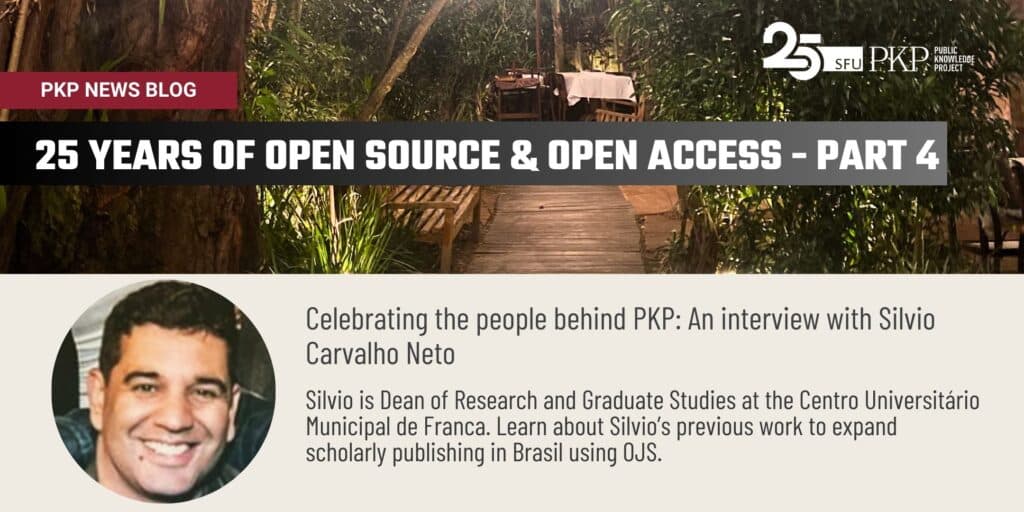
PKP’s 25th Anniversary interview series celebrates the history of the Project and those involved – Part 4 features Silvio Carvalho Neto, Dean of Research and Graduate Studies at the Centro Universitário Municipal de Franca.
For a quarter of a century, community partnerships have been key in PKP’s work towards making research a global public good. Getting into the stories behind these relationships, we asked some of our Partners to share what drives these connections.
We are grateful to Silvio Carvalho Neto for taking the time to share his stories. Relationships and stories like these show how global access to research and scholarly publishing has been an important area of focus for longer than some might have previously thought.
Let’s start with an introduction. What is your current role at Centro Universitário de Franca?
I am currently Dean of Research and Graduate Studies at the Centro Universitário Municipal de Franca, a public educational institution located in the city of Franca, in the Brazilian state of São Paulo. I work as a research professor in the Regional Development Graduate Program at this institution. My research areas and interests are projects involving technology and development, focusing on the application of technology in education.
How long have you been working to advance research dissemination and scholarly publishing? What have some of your milestones been?
I have been working with technology applied to education and scientific publishing for 17 years. My investigations showed the quality dimensions in virtual learning environments and the technology spread in Brazil, with a view to the wide use of PKP’s Open Journal Systems (OJS) for scientific journals.
What was your first memorable encounter with PKP?
My first encounter with PKP was in 2010, when I was responsible for implementing a project to establish an electronic journal portal at the Centro Universitário Municipal de Franca. From the first contact I was very interested in the magnitude and scope of the project, as I saw the potential that PKP initiatives had to change the world of scientific publishing, by strengthening open access in our country.
Where did that first spark of interest come from regarding working with PKP software and supporting PKP?
After having my first initial contact with PKP software, I realized the importance of the project for Brazilian journals. I was motivated with the opportunity to help understand the impact that PKP had on Brazilian publishers. Through scientific research, I sought to demonstrate how PKP was important in increasing the reach of Brazilian open access journals and how pervasive the use of the software was in the Brazilian scientific community.
How have the relational aspects of working together been important to achieving these Brazilian universities’ missions?
Most Brazilian journals are open access and most Brazilian publishers from universities have scarce resources. PKP’s OJS was fundamental for these publishers to make their journals global and have a worldwide reach. Understanding how this process took place was fundamental to situate the importance of PKP in the Brazilian scientific publishing market, especially for small publishers and universities.
Can you describe a time when community relationships helped Brazilian institutions overcome a challenge in the movement for open source and open access?
I believe it was at the time of consolidation of the PKP partnership with IBICT and SciELO, in the first decade of the 21st century, during 2006, when SciELO adopted OJS, and IBCT signed a partnership to disseminate OJS to the Brazilian community, renaming it with the Portuguese name of SEER. From that time on, Brazil became one of the main countries in quantitative terms regarding the use of OJS globally.
How does the relationship between the Brazilian community and PKP help improve the quality and reach of open source software and open access scholarship?
PKP, through its partnerships in Brazil and its proximity to the Brazilian community, is able to constantly disseminate technical improvements and new functionalities to the system. These ongoing improvements aim to continually improve the performance of Open Journal Systems. This constant evolution raises the quality level of Brazilian open access online journals, especially journals that are still in the initial phase of implementation and consolidation in the scientific community.
In your experience, what have you learned about the nature of community in scholarly publishing?
In my view, community connection in academic publishing is essential for the good development of science. In particular, the wide use and constant improvement of OJS functionalities have the capacity to connect scientists for dissemination, review, and collaboration, as well as for exchange of data and results in research projects. In this sense, PKP plays an important role in facilitating the process of scientific dissemination, peer review and publication in journals.
What projects or advancements can the community expect to learn more about in the future from you and your institution?
My research projects and scientific advances are focused on the impacts of the use of technology on the local community. Within the scope of the Postgraduate Program in Regional Development, my projects are focused on the application of technology in the local development process. In the health sector, research focuses on the use of Telemedicine and its practical impacts. In terms of education, investigations are focused on the use of technology for data sharing, disruptive education and the impact of excessive use of smartphones on the lives of children and teenagers.
Are there any other key messages about free and open source software, open access, your work, or our partnership, that you would like to share with the community?
I believe that the most important key message has to be related to the gratitude of us Brazilians to the PKP. Brazil owes a lot to the project created 25 years ago. The PKP initiative positively transformed the Brazilian scientific editorial community, consolidating it as an example of public sharing of research. Continuing this joint work can certainly bring future benefits to the exchange of open data, and the constant improvement of the quality of scientific investigations in the country.
More about Silvio Carvalho Neto
Publications of interest
Neto, S. C., Willinsky, J., & Alperin, J. P. (2016). Measuring, rating, supporting, and strengthening open access scholarly publishing in Brazil. Education Policy Analysis Archives, 24(54).
Shintaku, M., de Brito, R. F., & Neto, S. C. (2014). A avaliac? o dos portais de revistas brasileiros implementados com o SEER/OJS por meio do levantamento da indexac? o pelo Latindex e SciELO. Informação & Sociedade, 24(2).
Check these and sixty more items on Silvio’s Google Scholar profile.

